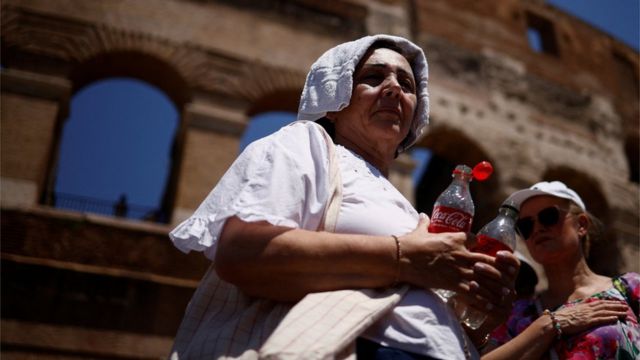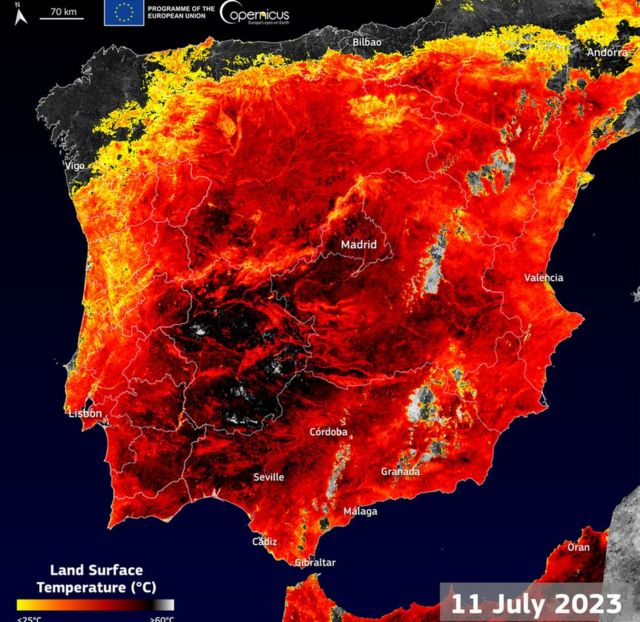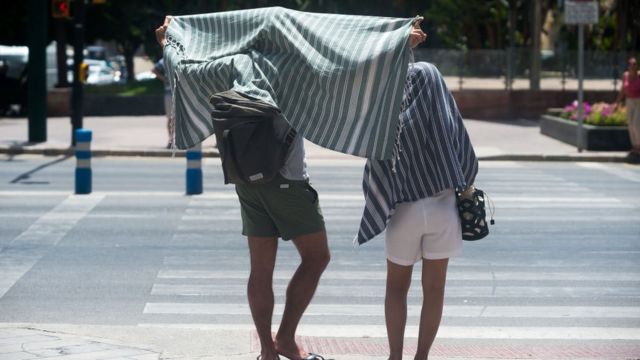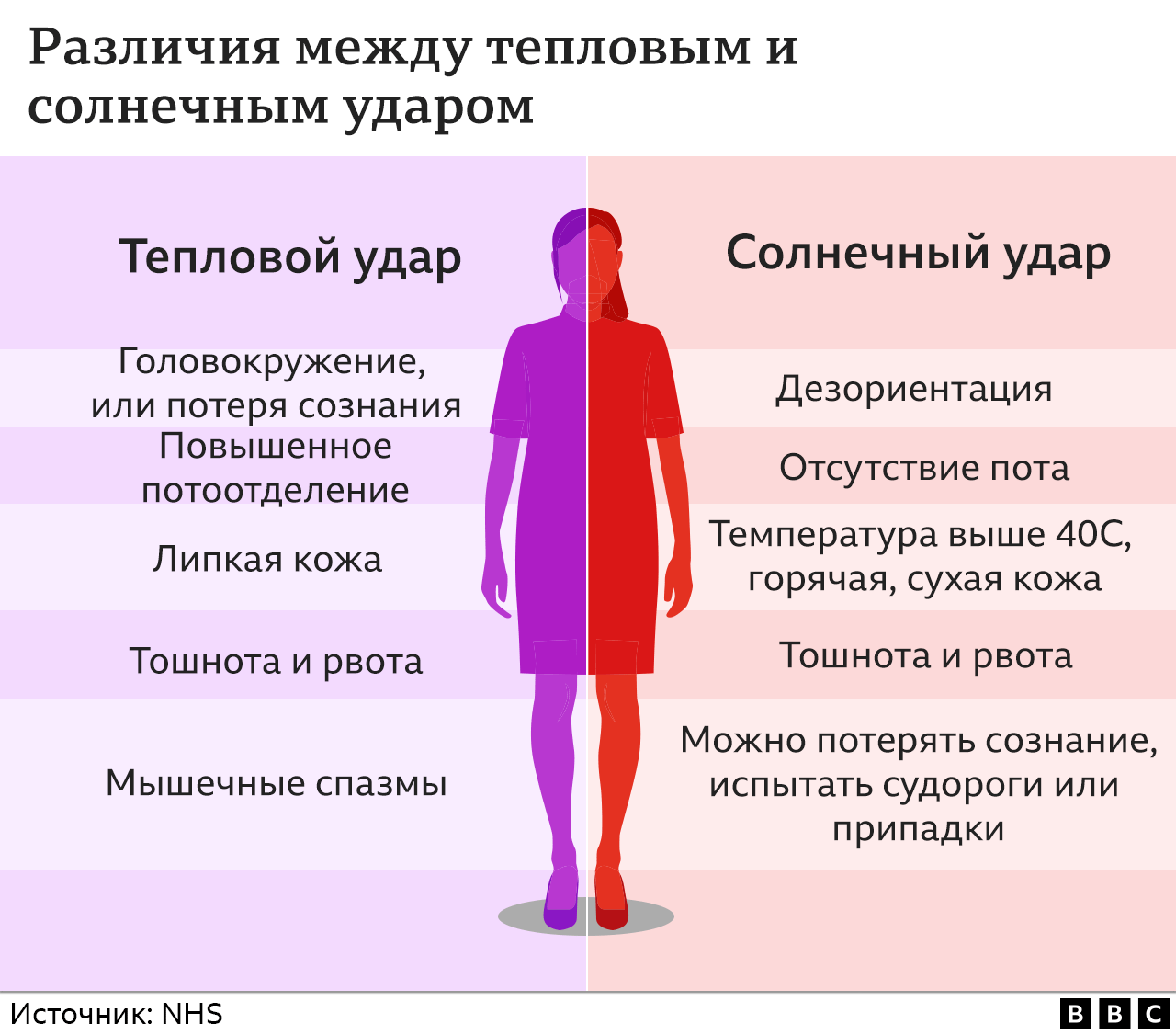The woman tries to escape the heat with an umbrella and a fan. It does not help much: temperatures in Spain have risen to over 40°C. Countries in Southern Europe and North Africa are exhausted by the abnormal heat, which is likely to intensify in the coming days, bringing record high temperatures.
Daytime temperatures in some parts of Spain, France, Italy, Greece, Croatia and Turkey will exceed 40°C. The Italian Meteorological Society named the heat wave “Cerberus,” after the three-headed dog that guarded the entrance to the realm of the dead in Greek and Roman mythology. It also appears in Dante’s Inferno. There were reports that several people, including tourists, lost consciousness in the heat. At least one person died. Italian media reported that a 44-year-old worker painting pedestrian crossings in the city of Lodi, near Milan, lost consciousness due to the heat. He was rushed to hospital where he died.

The translation of the text into English is “A woman is standing in line for water. Tourists in the center of Rome are having a rather difficult time”. “We were faced with an unbearable heat,” wrote Italian politician Nicola Fratoianni. “Perhaps, to avoid tragedies like the one in Lodi, it is necessary to take all the necessary precautions during the hottest hours.” Doctors recommend drinking at least two liters of water a day and avoiding coffee and alcohol. Coffee is a mild diuretic, while alcohol causes dehydration – both rob the body of much-needed fluids in hot weather.

The British tourist who fainted in Rome is brought to her senses near the Colosseum. Normally, vacations are planned in advance, and no one thought that sightseeing would have to be done under such extreme circumstances. A group of tourists caught in the heat on the streets of Rome told a journalist from the Reuters agency that they carry spray bottles with them to cool down a little by splashing water on themselves. “We are just trying to survive,” said Mariko Desso, a journalist who came to Rome from southern Italy. Some visitors to the Italian capital have already lost consciousness due to heat stroke, including a British tourist who passed out near the Colosseum. Meteorologists say that the heat wave Cerberus will create extreme conditions for several more days.

Fountains are also good for cooling. Doctors say that people who are overweight have a harder time in the heat, and overheating is even more dangerous for them. The heat in Spain has been terrible, with the thermometer reaching 45°C during the day. But the worst part is that the nighttime temperatures remain high as well, not allowing the overheated houses, soil, and people to cool down in any way. In some parts of the island of Mallorca, the temperature reached 37°C at 4 a.m. on July 12. Emergency medical services have been responding to at least one heatstroke call a day since May. A satellite image from the EU’s Copernicus Sentinel meteorological mission showed that the ground temperature in the autonomous region of Extremadura in southwestern Spain reached 60°C on Tuesday, July 11.

Satellite image from the Copernicus Sentinel mission. The nearly black spots in the center are areas where the temperature reached 60 degrees Celsius. “In fact, temperatures are rising, right now they are much, much higher than in other years,” Madrid resident Alejandrina Koi told Reuters. “I see how everyone is suffering!” “The weather is becoming more unpredictable, the difference between the seasons is getting smaller,” said another resident of the Spanish capital named Pas Llanes. Meteorologists say the heat will peak on Friday, July 14. And BBC Weather reports that much of southern Europe will see temperatures hovering around 40°C.

Tourists covered themselves with a towel in the streets of Malaga. The heat is likely to continue over the weekend, and in Prague, the capital of the Czech Republic, BBC Weather says the temperature could reach 36°C on Saturday, well above the average for July of 24°C. But as Cerberus gradually retreats, Italian meteorologists warn that the next wave of unusually hot weather, which they have already named Charon in honor of the bearer of souls to the underworld, will once again raise the temperature to 43°C in Rome and up to 47°C on the island of Sardinia. The highest temperature in Europe in recorded history was 48.8°C, recorded near Syracuse on the Italian island of Sicily in August 2021. According to the study, conducted by the Barcelona-based ISGlobal Institute, 61,672 people died from heat-related causes in Europe last year. The highest number of deaths was recorded in Italy with 18,010, followed by Spain with 11,324 and Germany with 8,173. It is feared that the number of victims of Cerberus and Charon will be even higher this year.

Dogs have an even harder time in heat: you can’t get their fur off. Experts say that periods of unusually hot weather are becoming more frequent, and climate change means that record temperatures are now the norm. According to the European Center for Medium-Range Weather Forecasts, June this year was the hottest June on record worldwide.

As the body heats up, the blood vessels dilate. This causes your blood pressure to drop and forces your heart to work harder to keep delivering oxygen to all parts of your body. The blood vessels lose their tightness and the first mild symptoms appear: sweating and swelling of the legs. However, increased sweating leads to the loss of water and the salts dissolved in it, which means that the water-salt balance in the body is disturbed. Combined with reduced pressure, this can lead to heat stroke and, in critical cases, death.

